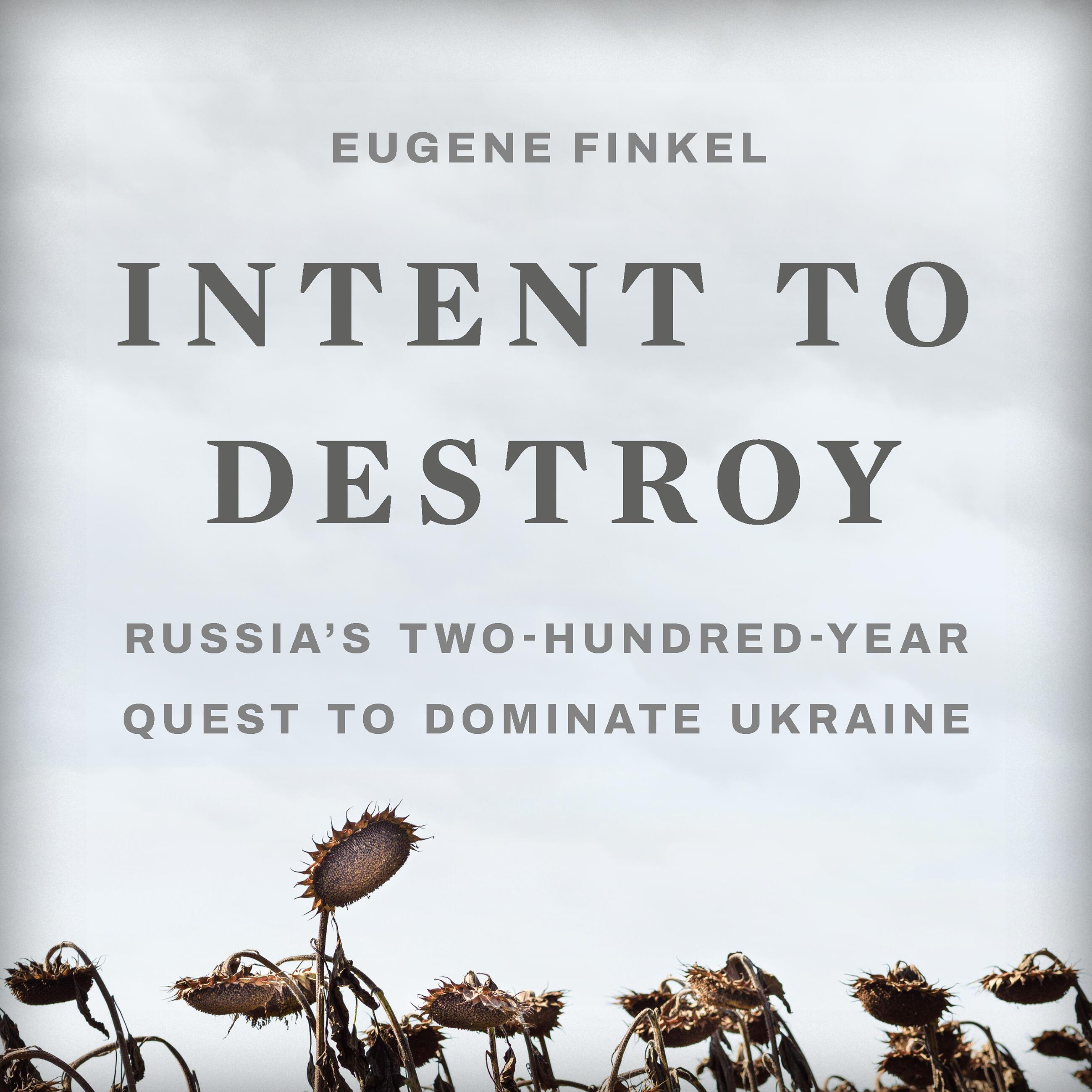Promotion
Use code BESTBOOKS24 for 25% off sitewide + free shipping over $35
By clicking “Accept,” you agree to the use of cookies and similar technologies on your device as set forth in our Cookie Policy and our Privacy Policy. Please note that certain cookies are essential for this website to function properly and do not require user consent to be deployed.
Intent to Destroy
Russia's Two-Hundred-Year Quest to Dominate Ukraine
Contributors
Read by Phillipe Bosher
Formats and Prices
Price
$27.99Format
Format:
- Audiobook Download (Unabridged) $27.99
- ebook $18.99 $24.99 CAD
- Hardcover $30.00 $40.00 CAD
This item is a preorder. Your payment method will be charged immediately, and the product is expected to ship on or around November 19, 2024. This date is subject to change due to shipping delays beyond our control.
Also available from:
Russia’s brutal invasion of Ukraine in February 2022 shocked the world. And yet, to Ukrainians, this attack was painfully familiar, the latest episode in a centuries-long Russian campaign to divide and oppress Ukraine.
In Intent to Destroy, political scientist Eugene Finkel uncovers these deep roots of the Russo-Ukrainian War. Ukraine is a key borderland between Russia and the West, and, following the rise of Russian nationalism in the nineteenth century, dominating Ukraine became the cornerstone of Russian policy. Russia has long used genocidal tactics—killings, deportations, starvation, and cultural destruction—to successfully crush Ukrainian efforts to chart an independent path. As Finkel shows, today’s violence is simply a more extreme version of the Kremlin’s long-standing policy. But unlike in the past, the people of Ukraine—motivated by the rise of democracy in their nation—have overcome their deep internal divisions. For the first time, they have united in favor of independence from Russia.
Whatever the outcome of the present war, Ukraine’s staunch resistance has permanently altered its relationship to Russia and the West. Intent to Destroy offers the vital context we need to truly understand Europe’s bloodiest conflict since World War II.
-
“Eugene Finkel, who correctly called Russia’s war against Ukraine ‘genocidal,’ makes the case here with erudition and verve. Those who want Russian perspectives on the war will find the relevant ones here.”Timothy Snyder, New York Times-bestselling author of On Tyranny
-
“Vladimir Putin claims that Russians and Ukrainians are one and the same people, but as Eugene Finkel convincingly argues in his new book, the relationship between the two nations has been anything but brotherly, with Russians doing their best to dominate and recently destroy Ukraine. A powerful antidote to those who claim that NATO is the main culprit responsible for the current war.”Serhii Plokhy, author of The Russo-Ukrainian War
-
“A masterpiece. This is a must-read to understand Russia’s mission to destroy Ukraine over hundreds of years—and the heroic resistance against it. Utterly essential if you want to know what’s at stake in the greatest war in Europe since WWII.”Peter Pomerantsev, author of Nothing Is True and Everything Is Possible
-
“An unprovoked invasion, a forced-adoption program, massacres of civilians, the upending of truth, a jagged ‘Z’ symbol deployed to signal loyalty to a repressive regime—the parallels between present and past in Russia's war on Ukraine are breathtaking. A work of deep expertise and sober sensitivity, Intent to Destroy connects these threads and details the repeated waves of devastation that have resulted from Russia's long-term obsession with eradicating Ukraine's separate identity.”Charles King, New York Times–bestselling author of Gods of the Upper Air
-
“A powerful indictment of Russia’s centuries-long obsession with eliminating the Ukrainian identity, language, and people.”Yaroslav Trofimov, author of Our Enemies Will Vanish
-
“Eugene Finkel tells a story of violence, identity, and the final stages of empire in Europe—the story of Ukraine. Starting with attempts by Imperial Russia in the nineteenth century to destroy Ukrainian identity, Intent to Destroy stretches through Stalin's genocidal famine in the 1930s, to Putin's invasion today. However, as Finkel shows, Ukrainian identity, even in military or political defeat, survived until the collapse of the Soviet Union; since then, and especially since 2014, it has evolved into something powerful and enduring. This is a book that can help explain the most important war and geopolitical crisis in Europe today and which does so with clarity, learning and sensitivity. Anyone interested in understanding what is happening in Ukraine today should read it.”Phillips Payson O’Brien, author of The Strategists
-
“As Mark Twain said, history does not repeat but it often rhymes—and it is certainly doing that in Ukraine today. Ukraine’s problem is that Russia has not only tried and mostly succeeded in dominating it for two hundred years, but that as a consequence its own distinct history and narratives have been eclipsed, especially for foreigners. Today, then, it is more vital than ever that we understand the roots of this war. Eugene Finkel has written a superb and above all readable guide for the perplexed. The current conflict did not begin in 2022, nor in 2014, nor at independence in 1991, and Finkel has done a masterful job in giving us a clear understanding of what we need to know. However, what makes his work especially valuable is that he does not shy away from tackling head-on difficult and controversial historical topics that many will find uncomfortable. He has done what needs to be done.”Tim Judah, author of In Wartime: Stories from Ukraine
-
“Russia’s attack on Ukraine in 2022 surprised many of us. But it shouldn’t have. Eugene Finkel’s masterful account of centuries of Russian designs on Ukraine spells out why Moscow won’t leave Kyiv alone and what defenders of Ukraine should do about it. A must-read account of the most important foreign policy question of our age.”Ben Ansell, author of Why Politics Fails
-
“This is a highly readable and yet, most rigorous account of how Russia has—for generations—tried to subjugate, repress, control and destroy the Ukrainian nation and the Ukrainian state. Finkel, a master of empirical detail and with immense comparative knowledge, makes plainly evident why what Ukrainians understand to be their core civic duty and identity is so frightening and despised by Russia, and tragically, why it must be in Russia’s view destroyed.”Olga Onuch, coauthor of The Zelensky Effect
-
“Eugene Finkel’s Intent to Destroy spans several centuries, delving into some of the most heinous atrocities perpetrated by the Kremlin on Ukrainian lands. Despite the extensive scope, the text is rich in nuanced analysis, being equally valuable for scholars and accessible to readers unfamiliar with the region. What stands out most is Finkel's approach: rather than striving for unattainable objectivity, he bravely acknowledges his deep investment in producing responsible scholarship that is guided by honesty.”Olesya Khromeychuk, director, Ukrainian Institute London
-
“The ongoing war between Russia and Ukraine is the culmination of centuries of painful interactions involving a punctuated but progressive rise of Ukrainian national consciousness and a concomitant rise of fear in a Russia threatened by an independent Ukrainian nation. Finkel provides an accessible, nuanced, and dynamically presented historical background to the conflict, highlighting Russia’s imperial drive and juxtaposing the historical places two nations find themselves in today.”Gulnaz Sharafutdinova, director of Russia Institute, King’s College London
- On Sale
- Nov 19, 2024
- Publisher
- Hachette Audio
- ISBN-13
- 9781668644171
Follow Eugene on Social
Newsletter Signup
By clicking ‘Sign Up,’ I acknowledge that I have read and agree to Hachette Book Group’s Privacy Policy and Terms of Use




